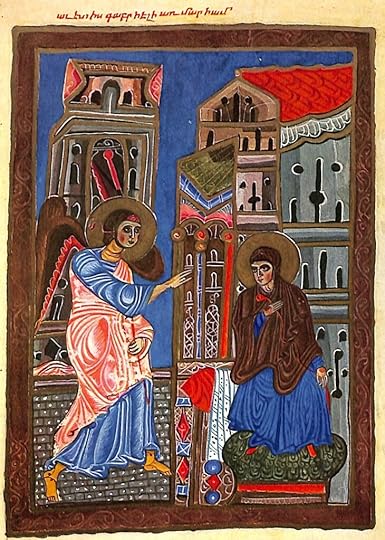Week 3, Day 3: Self as Believer
“But these are written so that you may continue to believe that Jesus is the Messiah, the Son of God, and that through believing you may have life in his name.” (John 20:31)
 Annunciation from 13th century Targmanchats Gospel, from Wikimedia Commons
Annunciation from 13th century Targmanchats Gospel, from Wikimedia CommonsOur sense of self begins very concrete, but then becomes more abstract over time. As children, we tend to think of “me” as “my body,” but as we enter adolescence we begin to think of the self as a member of a group. And as we move through adolescence into young adulthood, our brains continue to develop the ability to think abstractly. Our sense of self becomes more abstract as well. Some of us identify the self with our beliefs.
This is why churches who want to perpetuate themselves have youth programs. Research into belief formation has shown for decades that most of our core beliefs and identities are well established by the time we are in our early twenties. People who have not become Christians by the time they are young adults will likely never become part of a church. The proportion of new converts drops sharply after humans reach adulthood.
I’ve been in the church business long enough to understand that the most successful conversion efforts focus first on belonging (group identity and safety), and then believing. Folks who try to argue atheists into becoming believers (this kind of argument is called “apologetics”) rarely succeed; they really only reinforce their own beliefs and group identity as they experience rejection and derision from “outsiders.”
I’m using the word “believing” here to mean adopting a philosophy of the world and how it works, or learning to trust in certain belief systems. Most of us cobble together a worldview based on our own experiences, received wisdom from our communities and groups, religious rituals and traditions, and spiritual intuitions. We come to identify the self with these worldviews: “I’m a Christian,” or “I’m spiritual but not religious,” or “I’m an anarchist,” or “I’m a libertarian.” It can be both a way of seeing the world and a theory of how to change it.
Becoming conscious means becoming aware of these beliefs, both the explicit ones we can put into words and the implicit ones that we may find more difficult to express. In the same way that optical illusions make us aware of the effect of our perceptions on our own consciousness, we often only become aware of our beliefs when something challenges them. Some core belief of ours runs up against reality, or a contradictory story, and we have to make a choice of whether to hang on to the old belief or adjust our way of seeing and interpreting the world.
Belief is an important part of our identity. It connects us with our groups and gives us a framework for understanding our place in the universe.
David Benner in Spirituality and the Awakening Self describes this process as ever-expanding circles of self-understanding. Yes, I am a body, but I’m more than a body. I’m an American, but I’m more than my nationality. I’m a Christian, but I’m more than my religion. Some belief systems find this personal growth threatening, so they develop belief systems to put the brakes on the expansion of the self. Questioning old beliefs is perceived as backsliding or as dangerous to one’s salvation.
Yet at the heart of a belief in God is an understanding that we can never fully grasp the infinite. It is idolatry to confuse my beliefs about God with who God actually is. And when our beliefs become more important than our neighbor’s freedom and well-being, that’s when religious persecution begins. When we are most honest with ourselves, our beliefs are really a best-guess or a wager.
I see the Christmas story not so much as something to believe in, like a set of doctrines about God or Jesus, or the reality of the virgin birth and choirs of angels. I see it instead as something to believe through, or a story that stretches belief, that makes us question the binaries we invent between human and divine, power and powerlessness. It’s meant, I think, to push us toward an encounter with God-in-the-flesh.
Prayer: Lord, where beliefs as doctrines fall short, help me to trust in something that cannot be put into words. I believe; help my unbelief.



